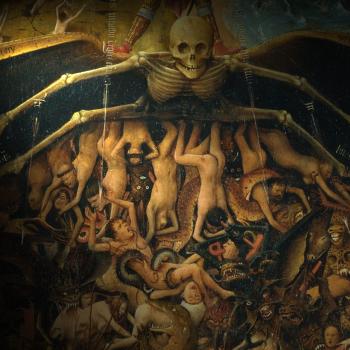By Greg Garrett
 It's an American action movie cliché, but that doesn't make it any less an American master narrative: the lone hero belts on his weapon (or in contemporary movies, a lot of weapons) and goes out to confront the world's problems. It's often done as a montage sequence, as the hero trains for the coming battle against the Big Bad, which makes the difference in the corresponding montage in Harry Potter and the Order of the Phoenix (2007) so apparent. In that sequence, the members of Dumbledore's Army, the Hogwarts students who have banded together to teach each other how to use defensive magic and to fight against the coming evil, are all featured learning, casting spells, and at last, celebrating their accomplishments. Instead of one, many; instead of a lone hero, a roomful, and when Harry Potter (Daniel Radcliffe) later prepares to depart to do the hero thing with Ron and Hermione, his friends Neville, Luna, and Ginny stop them. In the book, in fact, Neville Longbottom takes Harry to task for wanting to leave them behind:
It's an American action movie cliché, but that doesn't make it any less an American master narrative: the lone hero belts on his weapon (or in contemporary movies, a lot of weapons) and goes out to confront the world's problems. It's often done as a montage sequence, as the hero trains for the coming battle against the Big Bad, which makes the difference in the corresponding montage in Harry Potter and the Order of the Phoenix (2007) so apparent. In that sequence, the members of Dumbledore's Army, the Hogwarts students who have banded together to teach each other how to use defensive magic and to fight against the coming evil, are all featured learning, casting spells, and at last, celebrating their accomplishments. Instead of one, many; instead of a lone hero, a roomful, and when Harry Potter (Daniel Radcliffe) later prepares to depart to do the hero thing with Ron and Hermione, his friends Neville, Luna, and Ginny stop them. In the book, in fact, Neville Longbottom takes Harry to task for wanting to leave them behind:
"We were all in the DA together," said Neville quietly. "It was all supposed to be about fighting You-Know-Who, wasn't it? And this is the first chance we've had to do something real -- or was that all just a game or something?"
"No -- of course it wasn't," said Harry impatiently.
"Then we should come too," said Neville simply. "We want to help."
I bring up American action movies and British fantasy tales in this week's column on religion and politics not because I like them (although I do), but for what I think are very good reasons: Americans are powerful believers in individual effort, individual success, and individual salvation, and those master narratives of what individuals should be able to accomplish have always conditioned our faith, action, and political discourse. As I've been telling audiences and media as I talk about my new book on the wisdom of Harry Potter, One Fine Potion, J. K. Rowling's story gives us in the States a useful -- and, I believe, necessary -- corrective to the American story of self-made men and women, of radical self-reliance. Because as important as I believe individual responsibility and achievement to be, I think that the American narrative of self-interest stands in stark contrast to the Christian narrative. We are also, as individual members of the Body of Christ, called to serve each other, to challenge each other, and to love each other sacrificially, as Christ loved us. Harry Potter's story offers some valuable wisdom about the beauty and necessity of living our lives in community.
When I live in the individualistic story that I can and should take care primarily of myself and my family, and that all other Americans should do the same (for themselves and their families), I am living out the story of radical independence embraced by many people today, and emblematized by the historic Gadsden Flag, the "Don't Tread on Me" banner embraced by revolutionaries and by today's Tea Party. As Stanley Hauerwas has pointed out, for many of us our beliefs and actions are conditioned by our desire for secular "freedom," not to be tread on, imposed upon, or impinged upon. As Hauerwas notes in The Peaceable Kingdom, the story in which most of us have made our home in this culture is based on "the modern assumption that freedom is the necessary and sufficient condition of morality," that is, that the foundation of our moral and ethical decision-making should be "the greatest amount of freedom for the greatest number of people" (The Peaceable Kingdom: A Primer in Christian Ethics, Notre Dame, IN: University of Notre Dame Press, 1983, 9).
This sounds great, doesn't it? It sounds like the freedom to make and keep our money, the freedom not to have someone else tell us what we can and can't do, the freedom to do as we wish whenever we wish if we don't directly cause someone else harm. As an American individualist who doesn't like to be told what to do, I have long felt the pull of this narrative. But while it sounds like a wonderful thing, Hauerwas says this narrative does not lead to the common good, but is ultimately individualistic and self-deceiving. Our freedom even to be left alone may "require others to suffer for our commitments," and this self-deception makes us see others and ourselves as being forced to play "elaborate games of power and self-interest" (Peaceable Kingdom, 9).
Harry Potter reminds us that extreme individualism is villainous by making its supreme villain, Lord Voldemort, a person who cares only about self, who is the consummate player of elaborate games of power and self-interest. This becomes clear in Harry Potter and the Half-Blood Prince. After a visit to the past to view Tom Riddle, the boy who would grow up to become Voldemort, Harry's schoolmaster, Albus Dumbledore, points out to Harry what they had observed:





